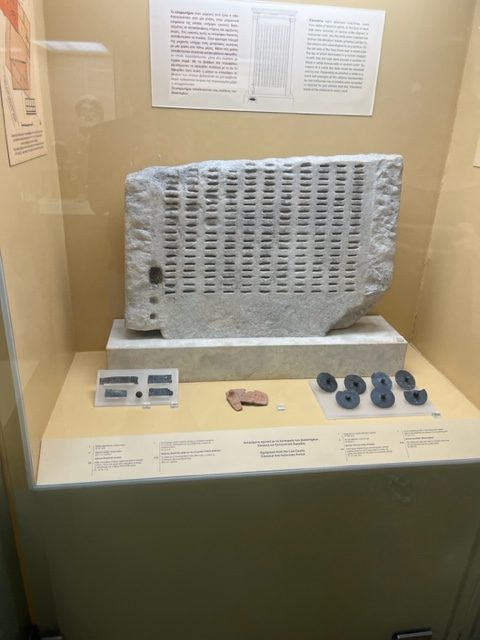Karon Law Blog
See the blog archive »Trial By Jury: As Old as the Ancient Greeks
Posted September 29, 2023[Editor’s/Founder’s Note-I recently returned from a vacation in Greece (yes, it was excellent). One of the coolest things I saw when I was there was an ancient Greek jury selection machine from between 200-500 B.C. So I started wondering how juries worked in those days and I asked my crackerjack Law Clerk, Cait Keefe to find out. Here’s her answer-JAK]

Trial by Jury: as old as the Ancient Greeks
By: Caitlin Keefe
For the most part, everyone is familiar with what a jury is and does in today’s context. But did you know that jury trials date all the way back to ancient Greece? In ancient Greece, there were two types of cases, private cases called dikai and public cases called graphai. However, there were no attorneys or prosecutors, just a jury- and a massive one at that.
There were three main types of courts in ancient Greece, homicide courts, and maritime courts. Jury trials were mainly held in popular courts, referred to as dikasterai.[i]
Before the trial itself, a plaintiff would have to bring a complaint and serve it on the defendant with a witness. The complaint was then brought to someone that we would recognize as a judge.[ii] This “judge” was not appointed or voted into office, they were selected by lot with the sole purpose of holding a preliminary hearing where the defendant could respond to the complaint and each party could conduct questioning or disclose any evidence they planned to use at trial.[iii] This was the ancient Greek version of discovery and pretrial motions. The judge would then send public cases to the popular court to be heard by a jury and private cases to an arbitrator, someone also chosen by lot who was over 60.[iv]
Once a case made it to trial in the popular court, it was heard by a jury, a group of people over the age of 30 with no criminal record.[v] Their role was much broader in scope than it is today, jurors in ancient Greece acted as both judges and jurors.[vi] While there was a figure head who oversaw over the trial, they were not permitted to instruct the jury, weigh in on objections, or make any rulings. [vii]
There were upwards of 6,000 jury members selected every year, each of which were paid a small amount for their service.[viii] It was unlikely that all 6,000 would vote on a single case, instead, they used a randomized machine that would choose up to 2,000 citizens to be present at court each day and anywhere from 200-1500 to hear and vote on a single trial. [ix]
Citizens would apply to become jury members through a machine called a Kleroterion. Each citizen had a bronze tag with their name that they would insert into the machine.[x] Black and white balls would then randomly be drawn out of a tube.[xi] If white balls were drawn, the corresponding row of names in the Kleroterion would get to serve as jury members, while black balls dismissed a row.[xii] When there was a full jury, everyone would get their tags back with the selected members also receiving a modest payment for food.[xiii] The purposeful randomization practiced by the ancient Greeks mimics an important pillar in our judicial system: Impartiality.
At trial, each party would present their side of the story through speeches and presentations. They would read statutes, testimonies, and even call witnesses, but no cross examination was allowed.[xiv] Once again, keep in mind that there were no attorneys to advocate. Some would resort to professional speech writers to help them prepare a convincing monologue to sway the jury in their favor.[xv] The rules in popular courts were extremely loose and most evidence was admissible, including hearsay.[xvi] After each side had a chance to present, a verdict was decided by a simple majority vote by the jury. They would cast their votes by dropping disks in a container to be counted.[xvii] They also voted on any damages proposed by either party.[xviii] Unlike today where there is a multi-level appeals process, ancient Greek trials issued one final verdict, meaning each party only had one shot to win.
While there are some extreme differences between the adversarial system we practice today and that of the ancient Greeks, there are similarities as well. The ancient Greeks, just like ourselves, recognize an absolute necessity: an impartial jury of peers free from corruption.
[i] Kelly Lambert, Law and Courts in Ancient Athens: A Brief Overview, The Kosmos Society (Sept. 20, 2018), https://kosmossociety.chs.harvard.edu/law-and-courts-in-ancient-athens-a-brief-overview/.
[ii] See Lambert, supra note 1.
[iii] See Lambert, supra note 1.
[iv] See Lambert, supra note 1.
[v] See Lambert, supra note 1.
[vi] See Lambert, supra note 1.
[vii] See Lambert, supra note 1.
[viii] Lily Withycombe, Reporting for jury duty in ancient Greece, The Canberra Times (Feb. 4, 2022), https://www.canberratimes.com.au/story/7605249/jury-duty-in-ancient-greece/.
[ix] See Withycombe, supra note 8.
[x] See Withycombe, supra note 8.
[xi] See Withycombe, supra note 8.
[xii] See Withycombe, supra note 8.
[xiii] See Withycombe, supra note 8.
[xiv] See Lambert, supra note 1.
[xv] See Lambert, supra note 1.
[xvi] See Lambert, supra note 1.
[xvii] See Lambert, supra note 1.
[xviii] See Lambert, supra note 1.
Recent Posts
- How Soon Should Your Lawyer Return Your Phone Call? January 9, 2026
- Karon Selected for 2025 Super Lawyers®List November 3, 2025
- President’s Budget Slashes TBI Prevention and Treatment Funds June 19, 2025
- Compulsory Auto Insurance Liability Limits Increase July 1, 2025 June 9, 2025


